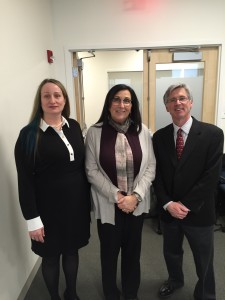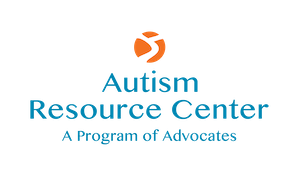Evolution of a Leader
Carrie Noseworthy has served HMEA’s Autism Resource Central, as a member of the Family Advisory Board for six years. Like many parents, she has the passion needed to make a difference. The desire to do that led her to taking an active role in her own community, in the region through her work on our board and she connected with others in the autism community across the state when she served as our AFAM liaison. From her own life and work experiences Carrie had a desire to see better understanding of autism in emergency crisis situations.

Pictured (L-R) Carrie Noseworthy, LEND Fellow, Shelley Baer, Director of Emergency Services, Beacon Health Options. Bill Cannata, ALEC
An autism diagnosis can bring a parent to their knees. It can also be a transformative event for families, shaping our lives , our focus and our avocations. Carrie’s story certainly is an inspiring example of how we can make a difference for our village.
Finding Your Path, Finding Yourself – by Carrie Noseworthy
This past May, I applied for a LEND Fellowship (Leadership Education for Neurodevelopmental Disabilities) through the Eunice Kennedy Shriver Center that included the ability to attend Suffolk University and work towards my Masters in Public Administration (MPA).
I had been working part-time as a family partner for Community Healthlink in Leominster for almost two years prior and I thought there was no harm in applying. A family partner works directly with families, providing family centered support, commonly in partner with an Intensive Care Coordinator (ICC). Backing up, before being a family partner, I was at home with my children for nine years. Luckily, I have a loving and supportive husband. For the most part, we had been on our own working our way through the autism world and all the systems for our boys. Sue Loring, our fearless Director, had encouraged me to apply for the Fellowship years ago, but I didn’t think the time was right. Fast forward a few years later and I reached out to Amy Weinstock of ARICA fame, and she encouraged me to apply to LEND as well. I had met Amy during a time when I was volunteering on the Executive Committee for Autism for Advocates in Massachusetts (AFAM) with Sue Loring. I honestly didn’t think I could make the logistics of the program work.
The spark that really ignited my LEND journey was an emergency surgery for a hernia—during the snowstorm last year. We all remember the storm! I went from someone who carefully scheduled everything and was used to functioning like a well oiled machine—Graeme and I navigating life and relying on each other—to emergency surgery and six weeks of healing—a parent’s worst nightmare. Amidst being couch bound, unable to move much, and watching a LOT of Law and Order, it hit me. Well, two things did. My own mortality, and the realization that somehow, even in the midst of severe weather and being out of commission, Graeme, my children and I were surviving! I thought, I am going to apply to LEND. If I couldn’t make it work, I would deal with it when the time came, but if I didn’t apply, I had a 100% chance of never being accepted.
Before I even heard from LEND about my application, I started thinking through what they call a Capstone Project. I thought that if I was accepted into this program, it was my time to make my mark and make a real difference for others. I was accepted into the LEND Program and into the MPA Program at Suffolk, and with the guidance of staff and some mentors, I honed my project to focus on autism training for mental health workers.
Although autism is not a criterion for access to Mobile Crisis Units, the crisis units serve many individuals with dual diagnosis of autism and mental health needs. They offer an alternative to the emergency rooms to address mental health crisis. They also work with ERs, providers, families, insurance companies and related staff to work through acute crises and hospitalizations. Through prior LEND classes and projects, I strategized that the Autism Law Enforcement Coalition (ALEC) would be the ideal entity to autism train the mental health workers that work for Mobile Crisis. The fit seemed a natural one for many reasons. ALEC’s trainers are police and firefighters who are also parents to children or adults with autism. Mobile Crisis routinely work with first responders in their day-to-day work with clients, so it seemed a logical fit. ALEC trainers charge no fee for their service and trainers can conduct training on site at each location.
I first approached Bill Cannata and explained my vision. Bill was very positive from the start of the project, an expert in his field and a pleasure to work with. Once Bill and I had worked out the logistics, I reached out to the Director of Emergency Services for the Massachusetts Behavioral Health Plan (MBHP). Bill and I later met with the agency and we were asked to provide training at their statewide meeting. Everyone was very positive and excited about the project.
On Friday, February 15, 2016, Bill Cannata, Program Director for the Autism Law Enforcement Coalition (ALEC) and I presented autism training for the February statewide meeting for the Emergency Services Program (ESP) in Worcester. The training was the culmination of my LEND Capstone project to bridge the existing gap for autism training for mental health professionals, in this case, Mobile Crisis Units throughout the state of Massachusetts. The group we trained were statewide directors and related staff. The goal was to start with the directors throughout the state, showcase the training, build contacts and then work on training direct staff.
The actual breakdown of personnel trained was: 17 MBHP in person (Massachusetts Behavioral Health Plan), 19 Emergency Services Program staff in person, 2 managed care organization representatives (Beacon & Tufts), 2 representatives from Office of Behavioral Health (OBH), a Division of Mass Health and about 7-10 more statewide staff who called in.
After the training, the overwhelming response from participants was very positive. I am hopeful that next steps will include some pilot sites throughout the state at various Mobile Crisis locations, which Bill Cannata and I hope to work on. Current legislation and statewide mandates are shining a much needed light on autism training mental health providers for appropriate diagnoses, treatment and quality of care over the lifespan for individuals with ASD as well as ensuring safety for providers and the children and adults that they serve.
If you are reading this, you are somehow involved or interested in the autism community in some way. We are all on separate journeys, at different points and although we have elements in common, we are all traveling our own path. I never thought that I would work again. I never thought anyone would help a 43 year-old woman pay for graduate school. And I never thought that my dreams and visions for making things better for others, learned and spawned through my own trials by fire would emerge, take shape and become reality. I encourage you to find your own path. It may be slow to start, but remember, we are all important. We are all relevant. We all have something to contribute. I can’t wait to see what that means for you.




